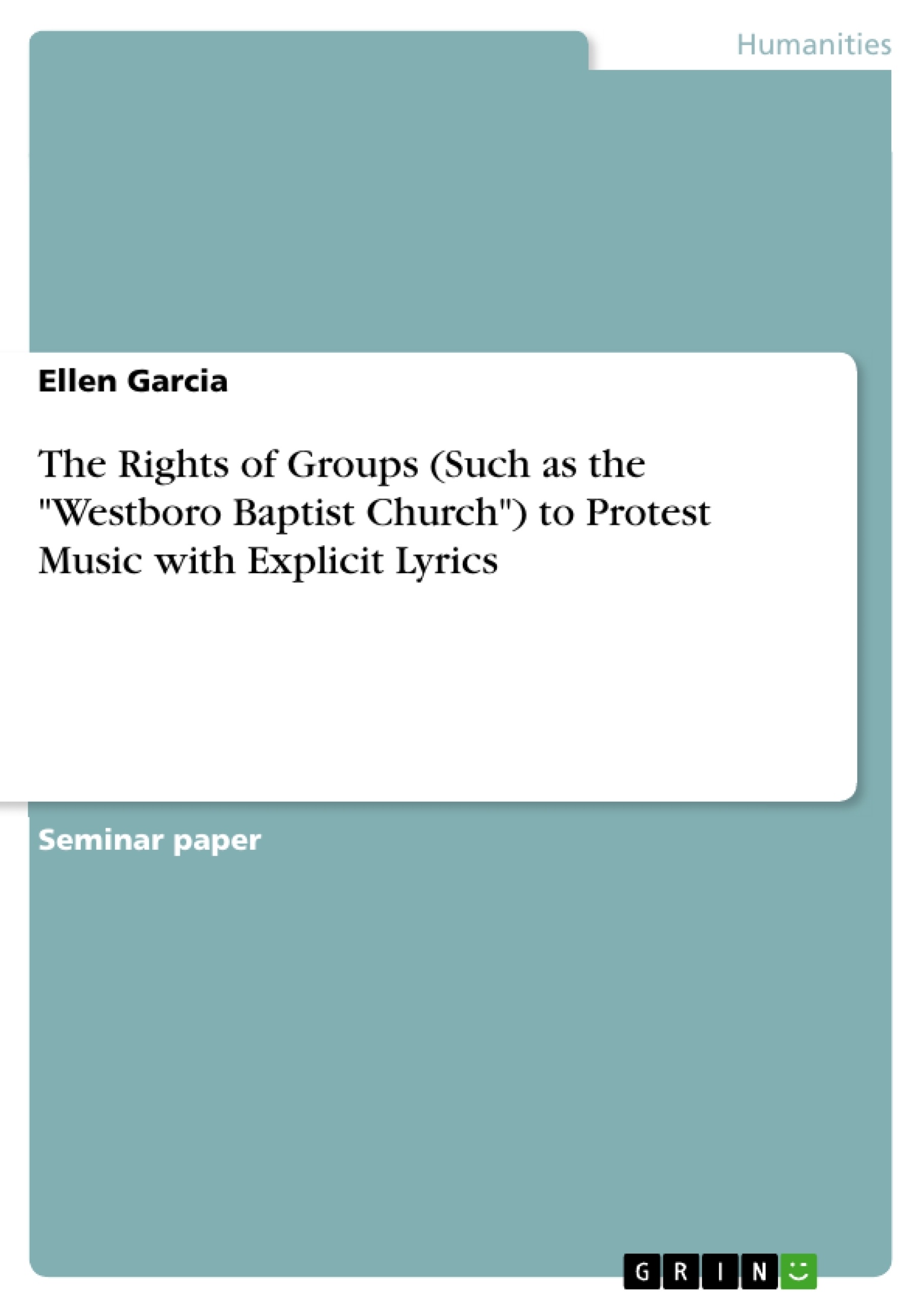The original intention of music censorship was to expurgate ideas that were perceived to be unacceptable to society. Censorship was being performed by concerned regulatory authorities. It is unfortunate that this job has now fallen into the hands of groups or other cults like the "Westboro Baptist Church," capitalizing on freedom of speech to paralyze the music industry. Recently, members of the "Westboro Baptist Church" protested a concert organized by Lady Gaga on the grounds that her music promoted homosexuality.The main reasons for music being censored in the US are explicit lyrics. Since the 1950s, individuals and groups of people have protested music with the main intention of either changing or silencing musicians’ ideas. It is believed that music censorship started with the birth of “rock n’ roll” which was protested because of its sexually suggestive lyrics. Since then, there have been instances of musicians having to change covers of their albums, re-word their songs to remove protested lyrics, artists being denied radio and tv coverage and even their live performances being protested. The bottom line argument for censoring music has always been the claim that the songs are vulgar and use explicit lyrics. This essay argues that such groups like tge "Westboro Baptist Church" have no right to protest against any kind of music.
Table of Contents
- Introduction
- The Original Intention of Music Censorship
- Music as a Form of Literature and Art
- The Musician's Perspective on Censorship
- Morality and the First Amendment
- Conclusion
Objectives and Key Themes
This essay argues that groups such as Westboro Baptist Church have no right to protest against any kind of music, focusing on the role of explicit lyrics in music and the implications of censorship for both artistic expression and societal understanding.- The impact of censorship on music and musicians
- The role of explicit lyrics in conveying truth and reality
- The importance of freedom of expression in a democratic society
- The relationship between morality, censorship, and societal progress
- The misuse of the First Amendment by groups like Westboro Baptist Church
Chapter Summaries
- The introduction establishes the history of music censorship in the United States, particularly focusing on protests against explicit lyrics in rock and roll and contemporary music. It raises the question of whether groups like Westboro Baptist Church have the right to silence musicians through protest.
- The essay then explores the original intention of music censorship, highlighting its focus on expurgating unacceptable ideas. However, it argues that this responsibility has fallen into the hands of groups like Westboro Baptist Church, who use freedom of speech to stifle creativity.
- The text presents music as a form of literature and art, emphasizing the value of explicit lyrics in portraying the complexities of real-world experiences. It challenges the notion that all explicit content is necessarily offensive, suggesting that different groups find pleasure in different musical styles.
- From the musician's perspective, censorship is presented as an infringement on their freedom of expression. Musicians are seen as storytellers and artists who strive to reflect the truths of society, including its darker aspects. The essay argues that censorship undermines the accuracy and authenticity of music.
- The essay concludes by examining the relationship between morality and freedom of speech, arguing that the First Amendment should not be used to suppress the expression of opinions, even those considered immoral by some. The essay advocates for a balance between freedom of expression and social responsibility.
Keywords
The essay revolves around the key concepts of music censorship, explicit lyrics, freedom of speech, morality, and the role of protest in a democratic society. It analyzes the impact of censorship on artistic expression, the relationship between music and societal understanding, and the potential misuse of the First Amendment by groups seeking to impose their own moral standards on others.Frequently Asked Questions
Does the Westboro Baptist Church have the right to protest music?
The essay argues that groups like the Westboro Baptist Church have no right to protest music in a way that aims to silence or paralyze the industry, as it infringes on artistic freedom.
Why is music censorship often focused on explicit lyrics?
Censorship historically aims to expurgate ideas deemed unacceptable by society, with explicit lyrics being the primary target since the birth of rock n' roll.
How does the First Amendment relate to music protests?
The essay discusses how groups misuse freedom of speech to suppress the creative expressions of others, challenging the limits of the First Amendment in a democratic society.
Is music considered a form of literature in this analysis?
Yes, the text presents music as a form of art and literature that reflects societal truths, including complex or "darker" aspects of reality through explicit content.
What is the musician's perspective on censorship?
From a musician's view, censorship is an infringement on freedom of expression that undermines the authenticity and storytelling role of the artist.
What was the original intention of music censorship?
The original goal was to remove ideas perceived as harmful or unacceptable by regulatory authorities, but it has shifted into the hands of private protest groups.
- Quote paper
- Ellen Garcia (Author), 2012, The Rights of Groups (Such as the "Westboro Baptist Church") to Protest Music with Explicit Lyrics, Munich, GRIN Verlag, https://www.grin.com/document/271689



